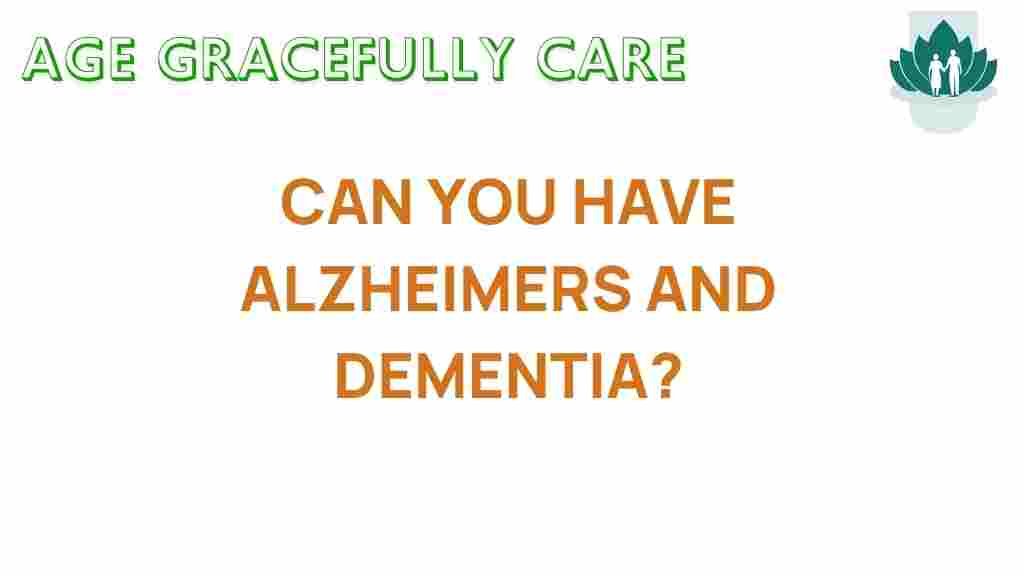The Intriguing Connection: Can You Have Alzheimer’s and Dementia?
The relationship between Alzheimer’s and dementia is a subject of great interest and concern as we navigate the complexities of brain health, cognitive decline, and aging. Understanding this connection is crucial not only for those affected but also for caregivers and family members. In this article, we will explore what Alzheimer’s is, how it relates to dementia, the symptoms of these neurological disorders, and the implications for memory loss and mental health. We will also provide practical tips for caregivers and those seeking to maintain brain health as they or their loved ones age.
Understanding Alzheimer’s and Dementia
To fully grasp the connection between Alzheimer’s and dementia, we need to define each term clearly.
What is Dementia?
Dementia is not a specific disease; rather, it is an umbrella term used to describe a range of symptoms associated with cognitive decline. These symptoms can significantly impact daily living and include:
- Memory loss
- Difficulty communicating
- Impaired reasoning or judgment
- Disorientation
- Changes in mood or behavior
The most common cause of dementia is Alzheimer’s disease, but there are other types as well, including vascular dementia, Lewy body dementia, and frontotemporal dementia. Understanding this distinction is vital for diagnosing and managing cognitive health and mental health.
What is Alzheimer’s Disease?
Alzheimer’s is a specific neurological disorder that accounts for 60-80% of dementia cases. It is characterized by the progressive degeneration of brain cells, leading to a gradual decline in cognitive function. The exact cause of Alzheimer’s is still unknown, but several factors contribute to its development:
- Aging: The most significant risk factor, with most individuals diagnosed being over 65.
- Genetics: Family history can increase the risk.
- Environmental factors: Lifestyle choices and health conditions may play a role.
Common symptoms of Alzheimer’s include:
- Memory loss, particularly recent memories
- Difficulty with problem-solving and planning
- Confusion with time or place
- Changes in personality and behavior
Alzheimer’s and Dementia: The Connection
So, can you have Alzheimer’s and dementia? The answer is yes. Alzheimer’s is a form of dementia, meaning that a person with Alzheimer’s will inevitably experience the symptoms of dementia as the disease progresses. However, not all dementia is caused by Alzheimer’s. This distinction is crucial when considering treatment options and support systems.
Symptoms and Stages of Cognitive Decline
Cognitive decline occurs in stages, and understanding these stages can help caregivers and individuals recognize changes and seek appropriate interventions.
Stages of Alzheimer’s Disease
Alzheimer’s progresses through several stages, each with its unique symptoms:
- Early Stage: Mild memory loss, difficulty finding words, and occasional confusion.
- Middle Stage: Increased memory loss, difficulty recognizing loved ones, and challenges in daily tasks.
- Late Stage: Severe cognitive decline, loss of ability to communicate, and complete dependence on caregivers.
Recognizing Signs of Dementia
In addition to memory loss, signs of dementia can include:
- Difficulty with language and communication
- Problems with planning and organizing
- Changes in mood, such as increased anxiety or depression
Maintaining Brain Health and Preventing Cognitive Decline
While there is currently no cure for Alzheimer’s or other forms of dementia, there are steps individuals can take to improve brain health and potentially delay cognitive decline:
- Stay Mentally Active: Engage in puzzles, reading, or learning new skills.
- Physical Exercise: Regular activity promotes blood flow to the brain.
- Healthy Diet: A diet rich in fruits, vegetables, whole grains, and healthy fats supports overall health.
- Social Engagement: Maintain relationships and social activities.
- Sufficient Sleep: Prioritize good sleep hygiene to support brain function.
Caregiving for Individuals with Alzheimer’s and Dementia
Caring for someone with Alzheimer’s or dementia can be both rewarding and challenging. Caregivers must prepare for the journey ahead by equipping themselves with knowledge and resources.
Tips for Caregivers
- Educate Yourself: Understanding Alzheimer’s and dementia can help you manage expectations and provide better care.
- Practice Patience: Cognitive decline can lead to frustration for both the individual and the caregiver.
- Establish Routines: Consistency can provide comfort to individuals experiencing memory loss.
- Seek Support: Join caregiver support groups or consult professionals for guidance.
Resources for Further Support
For those seeking additional information and support, numerous organizations provide resources for Alzheimer’s and dementia:
- Alzheimer’s Association – A comprehensive resource for information and support.
- National Institute on Aging – Research and information on aging and cognitive health.
Conclusion
The connection between Alzheimer’s and dementia is a crucial aspect of understanding cognitive decline and maintaining brain health as we age. While Alzheimer’s is a leading cause of dementia, it is essential to recognize that not all dementia is Alzheimer’s. Awareness of the symptoms and stages of these neurological disorders can empower individuals and caregivers alike. By taking proactive steps to enhance brain health and providing compassionate care, we can improve the quality of life for those affected by these challenging conditions.
As we continue to learn more about Alzheimer’s, dementia, and cognitive health, it is vital to remain hopeful and supportive. The journey may be complicated, but with understanding and compassion, we can navigate these waters together.
This article is in the category Health and created by AgeGracefullyCare Team
